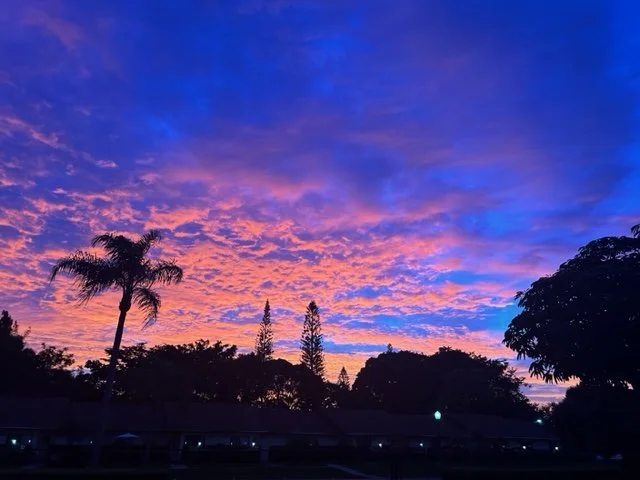Liturgy of the “We”
Beautiful sunrise in Palm Beach County, FL. Photo taken by Shabrae Jackson.
We are delighted to introduce our newest board member, Shabrae Jackson! An expressive arts facilitator and educator, Shabrae is the founder of Collective Tapestry and co-founder of UMBRAL, leveraging arts-based approaches to foster healing, belonging, and social change. What we admire most about Shabrae is her deep trauma-informed perspective, which reflects her exceptional self-awareness, mindfulness, and care. We are honored to have her join the BLK South Board of Advisors. Learn More
This morning, I woke up to a beautiful sunrise as colors of red hues came through my front door window. On most mornings, one of the first things that I do when I leave my bedroom is turn on the kitchen light to illuminate the space. But this morning I was also stepping into another tradition, the ritual of celebrating my son’s birthday. After greeting him with a song in the morning, I quickly began to prepare his birthday breakfast before he needed to leave for school. In about 15 minutes I had his plate hot and ready with eggs, toast, sausage and fresh fruit, although missing the grits, this was a classic Jackson breakfast.
When I was growing up, my Dad would wake up early and make us breakfast every morning before school. It didn’t even have to be our birthday. This was one thing that he knew how to do, a way to show us his care and his belief that a good day started with a full stomach. I remember this memory fondly and was able to fall into it this morning as a treasured tradition that I hope my son will carry on.
My son was born outside of Mexico City, on November 20th, the day of the revolution that commemorates the uprising against social inequality that brought in changes politically and socially across the country. He arrived 6 weeks early so all my plans to have my mother by my side were gone. But I was held, the village responded. Dr. Barbara Holmes, who recently passed in October of this year, was a beloved spiritual theologian and mentor for many who often spoke of the village response. According to Dr. B, as she was lovingly called, “we cannot carve out shared destinies in isolation, our lives are communal liturgies.” In other words, we are not made to go it alone.
In all my years involved in community-based work, this has been the lesson ever before me, the necessity for communal liturgies, a liturgy of the “we”. My week of bedrest before my son’s arrival meant relying on my colleagues and friends to cook, clean, and care for me. After my son’s birth, women in my neighborhood snuck into our home and decorated it as a way to welcome us in love. Without my mom by my side and some of my own traditions, I was embraced and held by the beauty and wisdom of Mexican women. These midwives accompanied me through the birth of my son and the first weeks at home. I was instructed on what to eat to recover more quickly, how to get my son to nurse and the importance of putting lettuce in the bath water to help him sleep at night. Their traditions and rituals accompanied me as I moved further across the threshold as a mother.
"Mother and Child" by Buford Evans (1976)
We have all been born into traditions that help to hold us. Traditions and rituals that we turn to for moments of celebration and devastation. They can ground us and call us to remembrance that we are still here, present, and breathing. In the past week I have been reflecting on the liturgy of the “we” and the traditions and rituals required for today’s time. What are the practices that can ground us in our humanity and in our story today?
How can the wisdom of lettuce in the bath water and celebrating birth and life be reminders of presence? How does the breath and life of neighborhood women act as a ritual gesture of wholeness?
On this day as I celebrate my son’s new year, I am reminded of community stories that call on the traditions and rituals that I need to stay present. The tradition of making food and creating space to feel whole and human. The rituals of looking out for each other, staying close. The forever teaching that interconnection and shared reliance are sacred and it invites us to take on new postures and ways of being for what is needed today.
Reflection Questions:
What are the traditions and rituals that help you to stay present?
How have you experienced communal reliance in your community?
“We respond to a deeply interdependent and responsive universe through shared experiences. This means that despite signs of postmodern fragmentation and the rise of radical individualism, we cannot carve out shared destinies in isolation. We are born not only into a wondrous and mysterious life space but also into communities of interpersonal reliance. These communities of care and crisis lend meaning and congruence to our lives and help to shape our collective stories. These stories and learned practices disclose the pitfalls and potential for human fulfillment, but more importantly, they describe a cosmos that is interwoven with mystery.”
RECOMMENDED READING





